Mark Dirks (’83) long ago leveraged his computer science minor into the development of corporate intranets at AT&T Inc. before co-founding Beacon Technologies, a website development and digital marketing firm based in Greensboro, North Carolina, that works with the higher education, retail/wholesale and property management industries.
These days, Dirks is Beacon’s chief business officer, and his wife, Tracy Dirks, is CEO. They have limited their payroll to about 60 employees and from the start have made giving back a core part of the business, focusing on hunger, health and children.
So, when a former client asked Dirks to build a website for his mission work in Rwanda, and thanked him with the gift of a handwoven basket made by village craftswomen, Dirks had an idea: Why not ask another client, which offers gift baskets, to sell them? That partnership became the Weaving Hope project and has funded the building of two preschools in Rwanda so far. Now, Dirks is strategizing additional projects.
Managing Editor Kelly Greene (’91) caught up with Dirks recently to learn more — and to hear his thoughts on how small businesses can make a big difference. Here are excerpts from their conversation, edited for length and clarity.
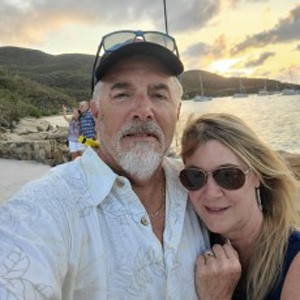
Mark and Tracy Dirks, whose company, Beacon Technologies, developed a partnership to build preschools in Rwanda<br /> Photos courtesy of Mark Dirks and Weaving Hope
Kelly Greene: Tell us a little about your Wake Forest experience, Mark. You graduated in 1983?
Mark Dirks: As a sophomore in high school, I placed seventh in a math contest for the state of North Carolina, so I was cocky going into Wake Forest — I’m a math guy. I got there and failed every test the first year except my final. I had Dr. (John) Baxley (P ’91,’92), and he said, “Take the final, and whatever you get will be heavily weighted toward your grade.” So, I studied. I made an A on the final. And I never looked back. That’s such a great teaching philosophy — if you have learned from these assessments that you’ve done throughout the course and turned it around, that’s what you should get.
I was in the first class that could have a minor in computer science, and it was part of the math program then. … When I got to computer science, I had a direction.
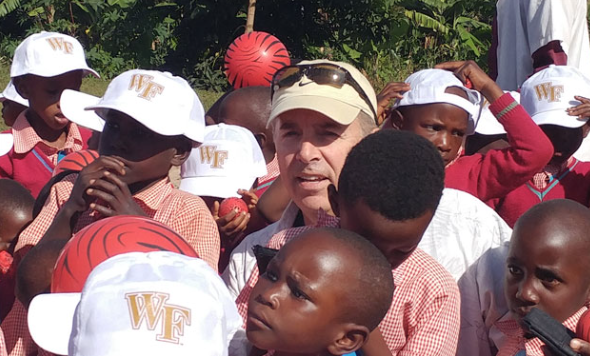
Rwanda preschool students in Wake Forest hats that Dirks shared.
KG: What was your journey from graduation to co-founding a technology company?
MD: When I left Wake Forest, I thought, “It’s going to be easy to get a job,” and I couldn’t find anything. So I went home to Hickory (North Carolina), and I worked as a computer operator in a furniture factory. Then R.J. Reynolds (Tobacco Co.) called me, and I was working as a temporary, making $300 a week as a programmer, … barely scraping by but getting valuable experience. I got a call from another friend who graduated from Wake Forest who was working at the Western Electric plant on Lexington Road (in Winston-Salem), and I went to work there. Then they shut down, and I transferred to AT&T in Greensboro.
There, we worked in a lab experimenting with the Internet for years. … and we built what was probably the world’s first corporate intranet in 1995. We had it up and running in six months. People could log in and see their paychecks. It was leading edge and exciting.
My partner here, John Scaramuzzo (now Beacon’s board chair and chief technology officer), handled the infrastructure side, and I covered the software side, and we saw the dot-com era coming. We thought we could probably leave AT&T and make a good living with our own business. So, we formed Beacon Technologies, and we grew from nine employees to 71 in a year, and it was too much. We were working with Accenture to rebuild the website for FAFSA (the Free Application for Federal Student Aid). Then 9/11 happened, government funding shifted quickly to Homeland Security, and we struggled.
We had built a website for Texas Southern University with KPMG, and we decided, “Let’s just focus on commercial and higher ed.” For the last 20 years, the main part of our business has been developing websites for colleges and universities around the country and providing hosting and digital marketing.
"Now, 300 children a year are getting an education and a good meal at the schools we built. And these schools will always be there as part of their communities, serving kids long after I’m gone. You can’t beat that, can you?"
KG: What made you focus, as a company, on charitable work?
MD: Our goal is not to be a giant company. Our goal is really to have a great culture and be a great place to work. It’s about enjoying our jobs. … We just won a regional award from United Way for our BeaconCares initiative, which has been increasingly involved in community volunteer work. Every quarter is a different focus. One quarter might be on the elderly, one might be on children, one’s on animals and the last one’s on families. The Beacon team gets excited about helping people during the Christmas season. That’s our culture, and people buy into it, so it’s been a cool place to work.
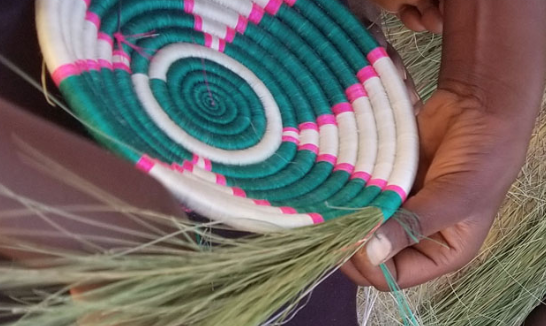
A basket being woven by a Rwandan artisan
KG: How did that culture lead you to start the Weaving Hope project?
MD: John Craig had been a client of ours, and he left his company … and decided to move to Rwanda to become a missionary with the Anglican Church. He was providing guidance to people there, coming out of the genocide, about how to start and run businesses, and he asked us for help building a website. He was back to visit and came by to say hello and handed me a beautiful basket that artisans in Muhanga had made.
And then he started telling me about the kids there, and the malnutrition and all the problems after genocide. He was working on a mission to build preschools mainly to fight malnutrition, which often stunts children’s growth. That way, they’d be sure to get a bowl of porridge high in nourishment every day, along with getting educated and having a place to go and stay out of trouble.
The whole time John was telling me his story, my brain was going, ‘How could we get these baskets over here? How do we sell them in the U.S. so they can build more preschools?’”
We told him we’d commit to building one of the buildings, and we partnered with another client of ours, burton + BURTON (a national distributor of baskets, balloons, floral and party supplies in Bogart, Georgia), to sell thousands of baskets. We spent 2017 and 2018 trying to get everything planned, then we sold them into 2020, with 100% of the proceeds going directly into building two schools.
(They raised $75,000, and the first preschool opened in 2019 in the Nkuzuzu community. The second school opened in fall 2021 and serves both as a preschool and a teacher training center for East African Christian College.)
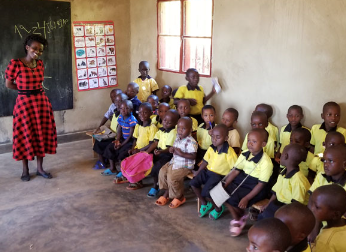
One of the preschools that Dirks and his partners toured
KG: Did you get to visit the schools?
MB: Yes, me and my wife and son, and our partners from burton + BURTON. And I’m so glad we did it, because I don’t think people realize how good we have it till you go to Rwanda and see what’s there, and you just go, “Holy cow. There’s no way kids in the U.S. could live like this.” We met the basket weavers, these groups of women that had to deal with a lot … of violence, and a significant amount of the male population had been killed. Here in the U.S., while we worry about whether students have their cell phones on, they’re just trying to go to school so they can eat.
Now, 300 children a year are getting an education and a good meal at the schools we built. And these schools will always be there as part of their communities, serving kids long after I’m gone. You can’t beat that, can you?
Also, before our trip, I reached out to everyone I knew on campus and asked for anything they could donate. We had to fill an extra suitcase with all the stuff. It was so amazing how the folks at Wake Forest jumped to help out … and you cannot believe how much it meant to those children, because they have so little.
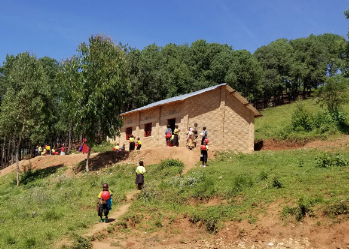
Heading home from preschool in an area called "The Land of a Thousand Hills"
KG: You’ve said you’re thinking about a new approach. What might be next?
MD: I have this painting (from Rwanda) called “Return to the Homeland.” I was looking at it, and the artist walked up to me and said, “For us to maintain this country, we all had to come back to our homeland and forgive each other. We all had to move on regardless of what happened.” It was an extremely emotional moment for me.
I said, “Neighbors were murdering neighbors, and you guys still had the ability to have the faith to go back and restart?”
He goes, “That’s the only way we could keep our identity as a country.”
He’s helping some of the orphaned kids learn to paint, and they are selling their paintings to help them make a living. Selling their paintings online might be the next phase. We’re going back this summer to see the second school, and to meet with a jewelry maker who wants me to show him how to expand his business, which would be another opportunity to help raise money to send back for Weaving Hope. We’ll see.

Gathering to celebrate the opening of a new preschool
KG: What is your advice to other Wake Forest alumni on how to make giving back part of their business’s culture?
MD: Make it a priority. There are so many ways to help and so many people that need help. Make working at a company more than generating revenue and profits. Believe me, working together outside of the business “stuff” builds relationships, trust and teamwork that translates to your customers on the business side. Like anything, it requires commitment from the top down. You have to figure out what you want to do and how you’re going to do it and make it a priority. That’s really it.
I was born in Las Vegas along with three brothers and a sister. We lived in a trailer in the desert outside of Vegas when I was a kid. So that’s where I’m from. And I look at what we have, how really fortunate we are, and it doesn’t take much to help. Hopefully it’ll spur others to help.
And it all goes back to Wake Forest. This is something that is a common trait among Wake grads. You see it all over. There’s another alumna (Carolina Lehoczky Fernandez (’79, P ’09)) doing great work in Rwanda. I think Wake really fosters Pro Humanitate, and it’s something I’m thankful it helped instill in me. “Proud to be a Deacon” says a lot more for me than people think. I am very proud to be a part of that community.


